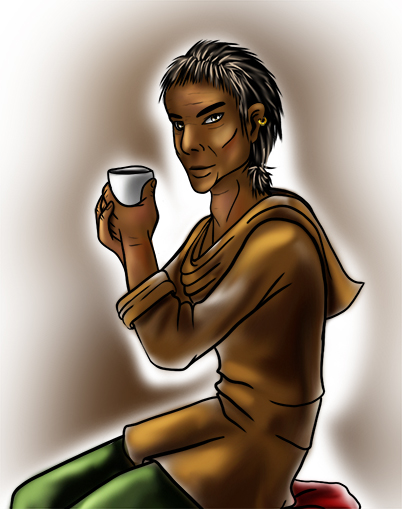Street Rats
"Neassa looked into it," Midir murmured as he slid down in the leather chair, propped his elbow on the armrest, and settled his cheek in his palm. "Gall's been siphoning money once set aside for the care of orphans and neglected children into another project. Care to guess which one?"
Jarosa lifted her lip. "Trying to find an aquatheerdaal replacement?"
He nodded, his eyes narrowing. "It's why Jiy has so many street rats. Other communities around Jilvayna have initiatives that set aside local tax money for disadvantaged children, but Jiy is beholden to the crown. Gall sees the city taxes as a personal fund, and he doesn't care who gets hurt when he withdraws from it."
"His time's coming to an end," Jarosa promised. "From the sounds of it, sooner rather than later."
Jarosa lifted her lip. "Trying to find an aquatheerdaal replacement?"
He nodded, his eyes narrowing. "It's why Jiy has so many street rats. Other communities around Jilvayna have initiatives that set aside local tax money for disadvantaged children, but Jiy is beholden to the crown. Gall sees the city taxes as a personal fund, and he doesn't care who gets hurt when he withdraws from it."
"His time's coming to an end," Jarosa promised. "From the sounds of it, sooner rather than later."
Street Rats
All artwork by Shade Melodique unless otherwise stated
street by armacuatro, Envato Elements
street by armacuatro, Envato Elements
························
Aquatheerdaal, an already sparse mineral, was mined for several hundred years before the known mines ran dry. Alternatives that can power existing tech have yet to be found.
Gall
Aquatheerdaal powered all modern tech his court received from Dentheria; lights, weapons, water purifiers and the like. But replacement shipments of the mineral had dwindled, then ended, and when his stewards delved into it, they realized that the general supply was depleted.
Mines throughout Siindernorth, Pelthine and Theyndora had run dry. Larger government entities like the empire hoarded what was left for themselves, refusing to share with the puppet rulers.
When it came to puppet king abuses, Dentheria rarely intervened. The Lords' and Second Councils saw cruelty as a useful subjugation tactic against the common empire citizen.
The military, however, disliked the more vicious because they inevitably had to put down the unrest that ensued from terrible laws.
When the aquatheerdaal shortage became too severe to ignore, Dentheria pulled back on troops and equipment and left the rulers, who heavily relied on the empire to keep the peace, on their own.
The military, however, disliked the more vicious because they inevitably had to put down the unrest that ensued from terrible laws.
When the aquatheerdaal shortage became too severe to ignore, Dentheria pulled back on troops and equipment and left the rulers, who heavily relied on the empire to keep the peace, on their own.
Experiencing mounting pressure from the rebel insurgents, Gall knew he needed an aquatheerdaal replacement for his military weapons and equipment. He sucked money from every available source to hire researchers, and the largest resource was the Jiy monies.
Neglecting general upkeep and releasing city workers was easy, but did not provide nearly enough metgal. He decided to siphon nearly everything he could lay his hands on, and one of the easiest places was social services for the poor. He could say a few words about freeloaders not deserving help, and the average citizen would agree with him.
Without government help, orphanages closed and the children were shuffled into the streets. The influx added to the strain on scarce charity resources, and for most kids, the only way to survive was to either steal what they needed, or steal the money to buy what they needed.
Middle-class merchants, annoyed at the increased thieving, named them rats--and it stuck.
························
Chinder
The kids formed groups for survival, and begged and thieved to support their members. Wealthier places, seeing them as unwanted vermin, drove them into the Grey and Stone Streets, where their presence was an unwelcome annoyance. Pressure built to drive them from the poorer sections of town, until a thief named Chinder stepped in.
Chinder, once a homeless lad himself, did not see the street kids as ugly problems but children in need. He decided to revamp their image. If the streets wanted to call them rats, he would change the definition.
Chinder started to refer to the kids as smart, agile, able to escape into the smallest of spaces. They could run a shank into the ground, and knew all the ins and outs of the street routes. They were kind, and if given the chance, helpful. They weren't guttershanks, they were crafty, if a bit willful, children.
He took several under his wing and taught them the best way to pick and steal--his way, of course. Under his tutelage, they became slyer, quicker, stealthier. They went after wealthier targets, and shared what they acquired. They earned the nickname rats, and proudly wore it as a badge of honor.
Chinder's most important rule was to only take what the target could give. That meant that rats should not steal from their own, who could not afford to lose a single bit, but from wealthier individuals who could lose one or two shells and not go hungry as a result.
Perception
Two things happened to change the general perception; the Old Gods’ Temple Laundry employees turned a blind eye to rats using the water and tubs for baths, and Maydie and Movique, owners of the Lells Outdoor Market, allowed rats to sell there.
Baths were important. "A clean rat is a trusty rat" spread through the urchins, as they realized they could pick more pockets or sell more merchandise (and catch fewer diseases), if they washed often. People simply trusted them more. Only the beggars demurred, because a down-and-out child made more money than one that appeared cared-for.
With the new, squeaky-clean trust came an increase in sales for those rats who sold handcrafted items like painted wooden slats or necklaces made from stones. Maydie and Movique noticed that tourists liked the 'folk art' the kids made, and offered reduced seller fees to any rat who wanted to set up in one of the Lells outdoor squares.
As the fee came out of what they made (so if they sold nothing, no fee), several took them up on the offer. Locals got to see a different side to the rats, and 'hardworking' and 'industrious' became part of the stereotype.
What began with Chinder continued with the rats he tutored. In the Grey and Stone Streets and throughout much of western Jiy, street rats became synonymous with sly, hardworking children who, through no fault of their own, ended up in the streets.
The rats, having little choice, made the most of this unfortunate circumstance and prospered.
Current street rats come in all sorts: thieves, pickpockets, beggars, sellers. Some help move items for stall owners to and from Lells storage, some are couriers. Some hook up with the underground, seeing opportunity in darker crimes. All fight to live in an environment not of their making, doing their best with the scraps they can grab.
The rats, having little choice, made the most of this unfortunate circumstance and prospered.
Current street rats come in all sorts: thieves, pickpockets, beggars, sellers. Some help move items for stall owners to and from Lells storage, some are couriers. Some hook up with the underground, seeing opportunity in darker crimes. All fight to live in an environment not of their making, doing their best with the scraps they can grab.






Interesting article. Has real Oliver Twist energy to it.
Thank you! :)